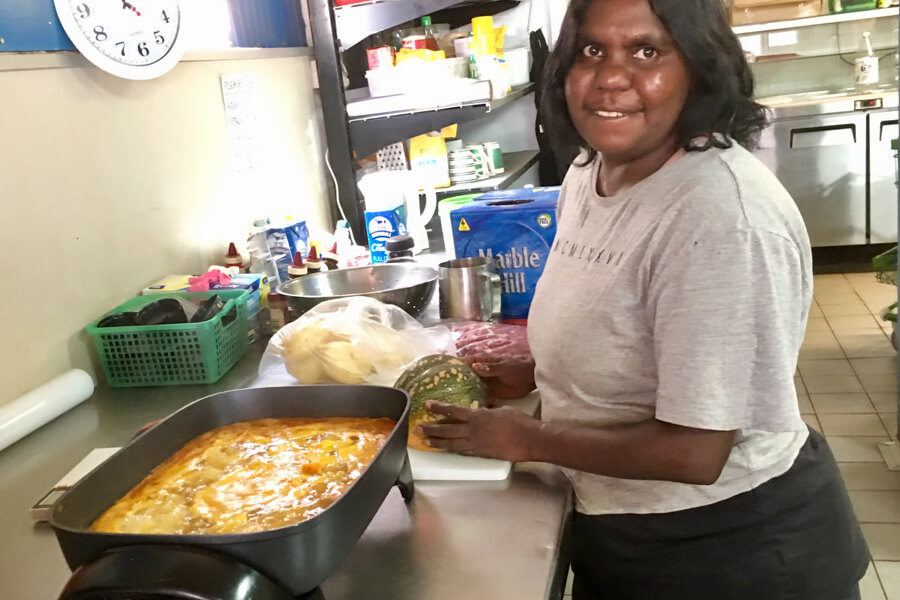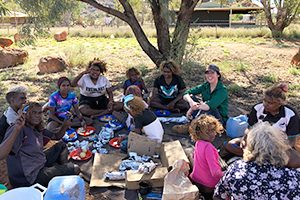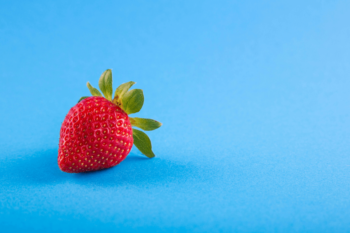Lessons from the bush: how remote Aboriginal communities are improving nutrition

DATE
TYPE Prevention Centre News
Bush picnics are a great way to bring together a captive audience of young people and Elders, who pass on their knowledge about traditional food, while Ms Hutchinson contributes to broader dialogue around nutrition.

“Everyone loves bush food and knows it’s important to them and their culture. So bush picnics are a powerful tool. We can have a chat informally about food, address a lot of issues, and enjoy a roo tail at the same time,” she says.
Ms Hutchinson is Project Officer on an MRFF-funded research project that is addressing food insecurity in both remote and urban Aboriginal settings. Her background is in nutrition, cooking and community development.
She has been living in the community of Amata since September, where she is working with the 400 locals as well as their neighbours in nearby Pipalyatjara to implement strategies identified by both communities to improve supply and demand for healthy food.
Situated 250km west of the Stuart Highway and just south of the Northern Territory border in the arid APY Lands, the communities where Ms Hutchinson is working rely on the local stores for most of their food. Food insecurity – when families do not have access to or cannot afford to purchase the healthy food they like – is still a significant contributor to poor diet.
The problem has grown worse in recent years since buffel grass, an invasive weed, has spread through South Australia and wiped out many of the native plants and animal species that local communities used to enjoy.
Working with Mai Wiru Regional Stores, Nganampa Health and the NPY Women’s Council, the Prevention Centre project is implementing and evaluating the impact of a suite of interventions to improve food security and dietary intake.
Ms Hutchinson’s activities in the two communities include running cooking workshops, collaborating with families on how to make meals more nutritious, and working closely with existing service providers and the local Mai Wiru stores. Mai Wiru have been working for several years to provide healthy food for local communities, for example by selling fruit and vegetables at cost price subsidised by increasing the price of unhealthy foods.
‘Mai Wiru’ translated from Pitjantjatjara means ‘good food’, and the stores have been successful in providing a range of high quality, healthy food for the communities.”
Rhiannon Hutchinson

“Our work with the community is trying to improve capacity, increasing nutrition knowledge about store foods, building on the skills base and supporting the store managers to do things like improve the layout of the stores so that demand for healthy food is increased.”
Decades of research in remote Aboriginal communities by project lead Professor Amanda Lee has shown that it is possible to improve food security, dietary intake and nutrition status. However, communities are concerned that these changes have not been translated into sustained improvements.
“This project is important because it’s building capacity and promoting concerted action to support local communities in their ongoing efforts to improve food supply and enjoy store foods which are most like traditional bush foods- fresh, tasty and healthy. So far, the results of process and impact evaluation are very promising” she says.
Ms Hutchinson is working alongside locally employed community members, who help to translate, ensure activities are relevant, and suggest what to cook or where to go for a bush picnic.
“I’m very fortunate to be based in the community. It allows you the opportunity to really build those relationships which are so important – and to work with community members to increase their capacity to conduct activities in the future,” she says.



